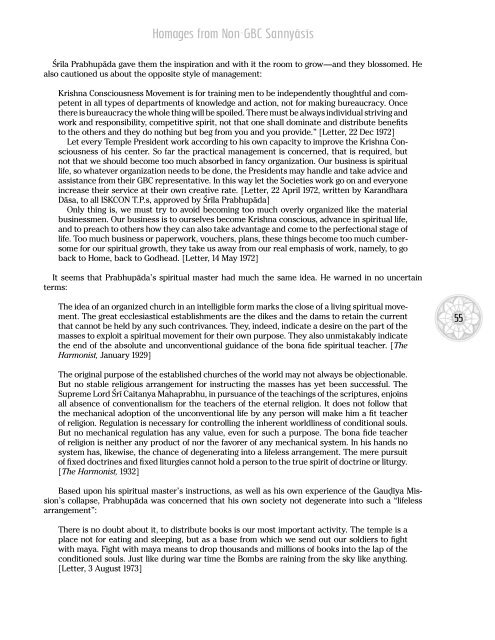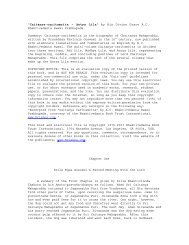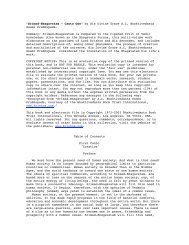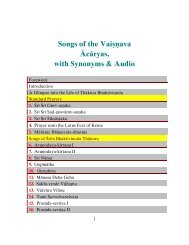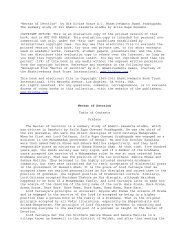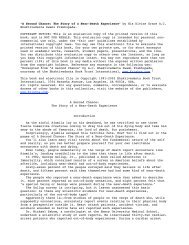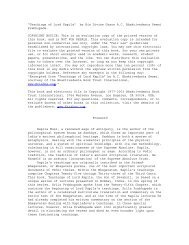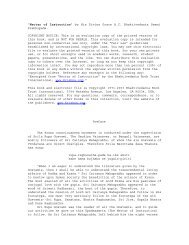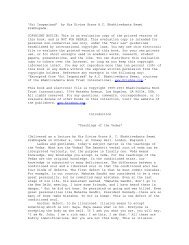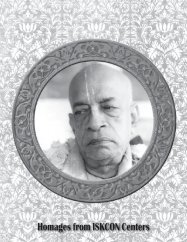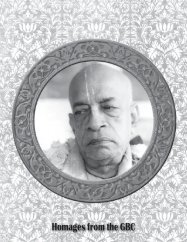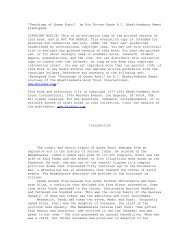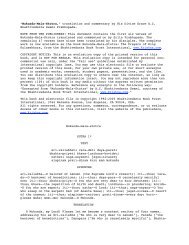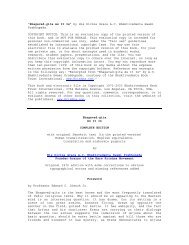Non-GBC Sannyäsés
Non-GBC Sannyäsés
Non-GBC Sannyäsés
Create successful ePaper yourself
Turn your PDF publications into a flip-book with our unique Google optimized e-Paper software.
Homages from <strong>Non</strong>-<strong>GBC</strong> Sannyāsīs<br />
Çréla Prabhupäda gave them the inspiration and with it the room to grow—and they blossomed. He<br />
also cautioned us about the opposite style of management:<br />
Krishna Consciousness Movement is for training men to be independently thoughtful and competent<br />
in all types of departments of knowledge and action, not for making bureaucracy. Once<br />
there is bureaucracy the whole thing will be spoiled. There must be always individual striving and<br />
work and responsibility, competitive spirit, not that one shall dominate and distribute benets<br />
to the others and they do nothing but beg from you and you provide.” [Letter, 22 Dec 1972]<br />
Let every Temple President work according to his own capacity to improve the Krishna Consciousness<br />
of his center. So far the practical management is concerned, that is required, but<br />
not that we should become too much absorbed in fancy organization. Our business is spiritual<br />
life, so whatever organization needs to be done, the Presidents may handle and take advice and<br />
assistance from their <strong>GBC</strong> representative. In this way let the Societies work go on and everyone<br />
increase their service at their own creative rate. [Letter, 22 April 1972, written by Karandhara<br />
Däsa, to all ISKCON T.P.s, approved by Çréla Prabhupäda]<br />
Only thing is, we must try to avoid becoming too much overly organized like the material<br />
businessmen. Our business is to ourselves become Krishna conscious, advance in spiritual life,<br />
and to preach to others how they can also take advantage and come to the perfectional stage of<br />
life. Too much business or paperwork, vouchers, plans, these things become too much cumbersome<br />
for our spiritual growth, they take us away from our real emphasis of work, namely, to go<br />
back to Home, back to Godhead. [Letter, 14 May 1972]<br />
It seems that Prabhupäda’s spiritual master had much the same idea. He warned in no uncertain<br />
terms:<br />
The idea of an organized church in an intelligible form marks the close of a living spiritual movement.<br />
The great ecclesiastical establishments are the dikes and the dams to retain the current<br />
that cannot be held by any such contrivances. They, indeed, indicate a desire on the part of the<br />
masses to exploit a spiritual movement for their own purpose. They also unmistakably indicate<br />
the end of the absolute and unconventional guidance of the bona de spiritual teacher. [The<br />
Harmonist, January 1929]<br />
The original purpose of the established churches of the world may not always be objectionable.<br />
But no stable religious arrangement for instructing the masses has yet been successful. The<br />
Supreme Lord Çré Caitanya Mahaprabhu, in pursuance of the teachings of the scriptures, enjoins<br />
all absence of conventionalism for the teachers of the eternal religion. It does not follow that<br />
the mechanical adoption of the unconventional life by any person will make him a t teacher<br />
of religion. Regulation is necessary for controlling the inherent worldliness of conditional souls.<br />
But no mechanical regulation has any value, even for such a purpose. The bona de teacher<br />
of religion is neither any product of nor the favorer of any mechanical system. In his hands no<br />
system has, likewise, the chance of degenerating into a lifeless arrangement. The mere pursuit<br />
of xed doctrines and xed liturgies cannot hold a person to the true spirit of doctrine or liturgy.<br />
[The Harmonist, 1932]<br />
Based upon his spiritual master’s instructions, as well as his own experience of the Gauòéya Mission’s<br />
collapse, Prabhupäda was concerned that his own society not degenerate into such a “lifeless<br />
arrangement”:<br />
There is no doubt about it, to distribute books is our most important activity. The temple is a<br />
place not for eating and sleeping, but as a base from which we send out our soldiers to ght<br />
with maya. Fight with maya means to drop thousands and millions of books into the lap of the<br />
conditioned souls. Just like during war time the Bombs are raining from the sky like anything.<br />
[Letter, 3 August 1973]<br />
55


